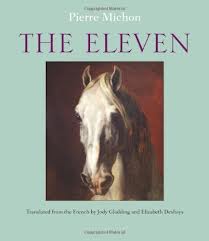The Eleven—Pierre Michon (Trans. by Jody Gladding & Elizabeth Deshays)
Francois Corentin numbered among those writers who were beginning to say, and surely to think, that the writer served some purpose, that he has not what he was believed to have been until then; that he has not that exquisite superfluity at the service of the Great, that resonant, gallant, epic frivolity to be drawn from the sleeve of a king and exhibited for scantily dressed young girls in Saint-Cyr or the Parc-aux-Cerfs; not a castrato or a juggler; not a beautiful sparkling object set in the crown of prince; not a procuress, not a chamberlain of the word, not a steward of pleasures; not any of those things but a way of thinking - a powerful mix of sensibility and reason to throw into the universal human dough to make it rise, a multiplier of man, a force for man's growth like the retorts for gold and the stills for wine, a powerful machine to increase man's happiness.
This was one of the three Early Reviewers books I got in the December batch.
The story was something of a labor of love for author Pierre Michon, who wrote it after something like 15 years of research and work on it, and is based on actual historical events and paintings. The fictional main character, Francois-Elie Corentin painted an important historical piece representing the eleven members of the Committee of Public Salvation during the French Revolution. The story alternates between the commission of the painting and its subjects (more of the historically accurate parts) to telling about the life of the fictional artist.
Beautiful language. Lots of quote options. I would be interested to read the original French version (especially since that's actually a pre-translated language I could read!) and see how literal is the translation; how many of the well-stated phrases are Michon's as opposed to the translators. A short book with an intriguing, concise story. I will say it's kind of a throwback to the French writers of the 1800s, who utilized a great deal of exposition in their stories. Like The Hunchback of Notre Dame, with its ridiculous amount of pages of description of Paris before you even meet Quasimodo. Additionally, like the Classics, there are long passages of exposition with very little punctuation. Which leads to long pages with not a lot of stopping points. But definitely a worthwhile, short read.



Comments
Post a Comment